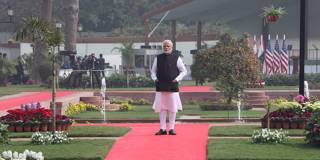If Indian Prime Minister Narendra Modi had wanted to organize an effective response to the COVID-19 crisis, there is no secret as to what he could have done. The problem is that the best policies would have been much more politically difficult than putting on a show of bravery and boldness.
BERKELEY – Indian Prime Minister Narendra Modi’s penchant for theatrics has had deadly consequences for India’s poor. That was certainly the case with his disastrous demonetization policy in 2016 and his government’s rushed implementation of a national Goods and Services Tax, which resulted in widespread harassment of small businesses.
But these flubs were merely the opening act. By imposing one of the world’s harshest COVID-19 lockdowns before preparing adequately or consulting with lower levels of government, Modi has inflicted unprecedented damage on India’s economy and on the poor, who live hand-to-mouth at the best of times. According to some estimates, more than 120 million people lost their jobs and incomes immediately after the lockdown was ordered on March 24. And about half of the country’s population of 1.38 billion is likely to have been impoverished, with many approaching starvation levels.
Shortly after the lockdown started, India’s finance minister, Nirmala Sitharaman, announced a relief package amounting to under 0.5% of GDP. The program consists primarily of extra food rations, and merely frontloads pre-existing small income grants for farmers, while offering a pittance in cash assistance for women with bank accounts tied to the government’s financial inclusion program, known as Pradhan Mantri Jan Dhan Yojana. And survey data suggest that only about half of India’s poor women have Jan Dhan bank accounts.

BERKELEY – Indian Prime Minister Narendra Modi’s penchant for theatrics has had deadly consequences for India’s poor. That was certainly the case with his disastrous demonetization policy in 2016 and his government’s rushed implementation of a national Goods and Services Tax, which resulted in widespread harassment of small businesses.
But these flubs were merely the opening act. By imposing one of the world’s harshest COVID-19 lockdowns before preparing adequately or consulting with lower levels of government, Modi has inflicted unprecedented damage on India’s economy and on the poor, who live hand-to-mouth at the best of times. According to some estimates, more than 120 million people lost their jobs and incomes immediately after the lockdown was ordered on March 24. And about half of the country’s population of 1.38 billion is likely to have been impoverished, with many approaching starvation levels.
Shortly after the lockdown started, India’s finance minister, Nirmala Sitharaman, announced a relief package amounting to under 0.5% of GDP. The program consists primarily of extra food rations, and merely frontloads pre-existing small income grants for farmers, while offering a pittance in cash assistance for women with bank accounts tied to the government’s financial inclusion program, known as Pradhan Mantri Jan Dhan Yojana. And survey data suggest that only about half of India’s poor women have Jan Dhan bank accounts.